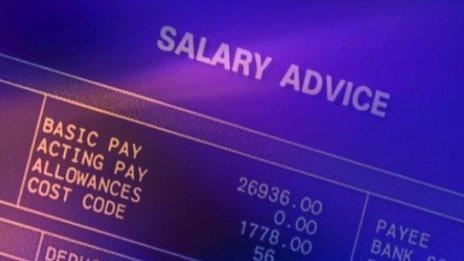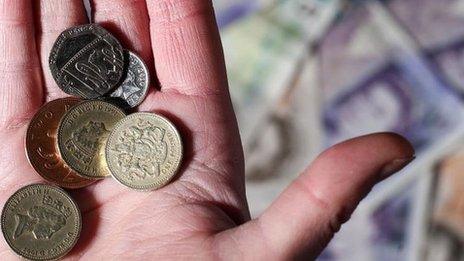Living standards squeeze continues in UK, says IFS
- Published

Slow wage growth is the key to a squeeze on household budgets recently
Average UK living standards have fallen "dramatically" since the recession and will not reach pre-crisis levels by the next election, economists have said.
The Institute for Fiscal Studies (IFS) calculated that a mid-range household's income between 2013 and 2014 was 6% below its pre-crisis peak.
This was felt equally across high and low income groups when the cost of living was taken into account.
But those on low incomes could feel the squeeze more in the coming years.
This was the result of further cuts to benefits and tax credits, the IFS said.
The findings will further fuel the political debate about the UK's economic recovery and whether this will benefit all groups of society equally. The IFS suggested that, so far, this debate had suffered from a lack of up-to-date information.
Inflation effect
In an early release of a chapter of the annual IFS Green Budget, the group has calculated that a household in the middle of the income scale has seen a 6% drop in income since 2007 to 2008, although the fall in income had now come to a halt.

The analysis suggests that those near the top end of the scale, 10% from the very richest, have seen their incomes hit hardest, with a fall of 9% since the recession.
Meanwhile, those near the bottom, 10% from the very poorest, have seen their incomes drop by 2.4% over the same period.
This reflected the fact that earnings had increased slower than prices, while benefit rates had kept up with the cost of living.
However, the IFS said that those with relatively high incomes had benefitted from cheaper mortgage rates.
In contrast, rising food and energy prices, which formed a bigger proportion of the spending of poorer households, had risen faster than the average cost of living measured by inflation.
The report said that inflation between 2008 and 2013 was 20%, while energy prices rose by 60% and food prices were up by 30% over the same period.
"Looking forward, there is little reason to expect a strong recovery in living standards over the next few years," the report said.
"Given this, it seems highly unlikely that living standards will recover their pre-crisis levels by 2015 to 2016."
It added that earnings might pick up faster than benefits and tax credits, which meant the poorest might be squeezed harder than others.

The cost of living debate has been high on the political agenda
Paul Johnson, director at the Institute for Fiscal Studies, told the BBC: "The losses are pretty flat across the income distribution."
He said earnings had started to move more in line with prices, which would "continue to be the case" during the next year, although he warned that this could be offset by higher interest rates.
Mr Johnson said the increase in the number of people going back to work was "remarkable".
But he added: "If you look at incomes it looks like the poor are going to do rather badly and the somewhat better off, a bit better over the next couple of years."
Reaction
The IFS research came on the same day that the Office for National Statistics (ONS) said that UK real wage growth was the strongest in the G7 group of countries before the financial crisis.
However, post-downturn, the UK has experienced the largest fall in real wage growth among this group of countries - the UK, the US, Japan, Italy, Germany, France and Canada.
Labour has been making a political point for some time over the cost of living. Earlier this month, party leader Ed Miliband said middle-class families were facing a "crisis of confidence" as a result.
On Thursday, the Chancellor, George Osborne, said: "The IFS have made clear just how much poorer the country is as a result of Labour's great recession, but also that the fall in incomes 'has probably come to a halt' and that the median household will see a rise in household income in 2013-14."
Catherine McKinnell MP, Labour's shadow Treasury minister, said: "Working people are worse off under the Tories.
"A Labour government will act to ensure we can earn our way to higher living standards for all and tackle the cost of living crisis. We will freeze energy prices until 2017, expand free childcare to make work pay and ensure 200,000 new homes are built every year by 2020."
However, the coalition has said that workers had been gaining the benefit of a pick-up in the UK economy.